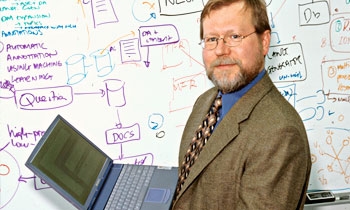Video Game Aims to Train Adults to Overcome Critical Decision-Making Biases
$8.7 million, 4-year contract supports UAlbany research and development of educational game
ALBANY, N.Y. (December 1, 2011) -- A University at Albany research team is developing a computer game to train people to recognize cognitive biases they routinely use when confronted with incomplete information or operating under time pressure. Such biases can lead to bad decisions in critical matters, including national security.
College of Computing and Information Professor Tomek Strzalkowski and co-investigator Jennifer Stromer-Galley in the Department of Communication are leading an interdisciplinary team of researchers, including Laurie Feldman and Elana Gordis in the Department of Psychology, to develop a non-commercial video game to help players recognize their biases and learn not to depend on decision-making shortcuts when processing and assessing information.
"This project will advance educational game research by systematically and experimentally identifying a serious game design that leads to most effective learning," explained Strzalkowski, who is also director of the University's Institute for Informatics, Logics and Security Studies, where the research will be conducted. "Our objective is to turn computer games, which people generally view as entertainment, into powerful learning tools."
The 50-month CYCLES project (Cycles of Your Cognitive Learning, Expectations, and Schema) project is supported by a $8.7-million contract from the U.S. Air Force, and is sponsored by the Sirius Program of the Intelligence Advanced Research Projects Activity (IARPA), an arm of the Office of the Director of National Intelligence, which heads the nation's intelligence services.
In partnership with the local game company 1st Playable Productions, the CYCLES project will develop a computer game that will teach players how to recognize six common cognitive decision-making biases: confirmation bias, fundamental attribution bias, bias blind spot, representativeness bias, anchoring bias and projection bias. The goal is to reduce players’ dependency on bias in real decision-making situations by as much as 65 percent. "The problem is one that psychologists have been working on for a very long time with limited success," said Feldman.
 |
|
Professor Tomek Strzalkowski, co-investigator on a UAlbany research team developing a program to help decision-makers recognize internal biases. (Photo Mark Schmidt) |
"Although people are hard wired to attend to certain information and disregard other information when making decisions, we can train them through a carefully designed game to become more aware of this process," Stromer-Galley said. "Our game can provide them cognitive tools and ways of thinking to circumvent the harmful effects of biases that can lead to bad decisions."
Although cognitive biases can sometimes be helpful in familiar situations or in dealing with predictable threats, they can lead to catastrophic failures in assessment of unfamiliar and unpredictable adversaries. "The 9/11 terrorist attacks and the Iraq weapons of mass destruction debacle are two well publicized examples in our recent history," explained Strzalkowski. "Such critical errors in decision making are what we want our game to train people to avoid."
With researchers at Colorado State University and the University of Arizona, the UAlbany team will conduct a series of experiments with undergraduate students to test various game mechanics' effect on learning about decision making and cognitive biases. They also are working with consultants from the intelligence community to make sure the game is ultimately relevant to analysts.
Stromer-Galley explained, "Our aim ultimately is to have people not only learn about these biases but to begin to think differently when they are faced with a decision and do not have all the information and all the time they want."
Strzalkowski and Stromer-Galley have been involved in prior research projects that bring together computational linguistics and social science to analyze large volumes of communication and interaction in online contexts, including online games or chat rooms.
"By harnessing the theoretical and empirical research from the social sciences with the sophisticated analysis techniques from computational linguistics, we have been able to really push forward understanding about social and cultural aspects of online communication. The CYCLES project naturally extends our work into new areas of learning and education," said Strzalkowski.
![]() For more news, subscribe to UAlbany's RSS headline feeds
For more news, subscribe to UAlbany's RSS headline feeds
A comprehensive public research university, the University at Albany-SUNY offers more than 120 undergraduate majors and minors and 125 master's, doctoral and graduate certificate programs. UAlbany is a leader among all New York State colleges and universities in such diverse fields as atmospheric and environmental sciences, business, education, public health,health sciences, criminal justice, emergency preparedness, engineering and applied sciences, informatics, public administration, social welfare and sociology, taught by an extensive roster of faculty experts. It also offers expanded academic and research opportunities for students through an affiliation with Albany Law School. With a curriculum enhanced by 600 study-abroad opportunities, UAlbany launches great careers.


